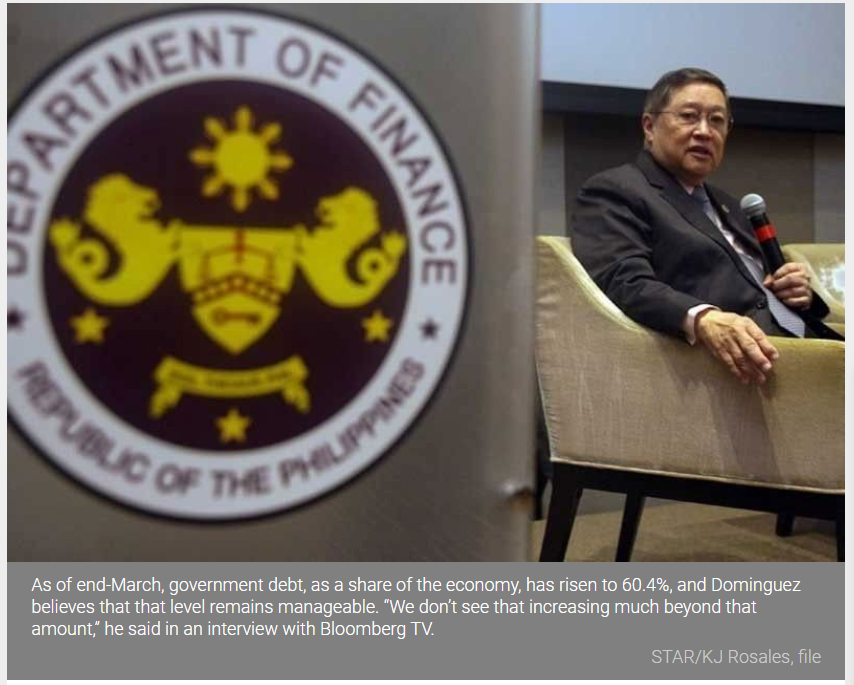Philippines: Pandemic-induced debt growth may have peaked already — Dominguez
MANILA, Philippines — The pandemic-induced rise of government debts likely hit its peak already, and a return to pre-crisis fiscal health could happen late next year, Finance Secretary Carlos Dominguez III said Wednesday.
As of end-March, government debt, as a share of the economy, has risen to 60.4%, and Dominguez believes that that level remains manageable. “We don’t see that increasing much beyond that amount,” he said in an interview with Bloomberg TV.
“We think that’s about the peak,” he added.
Dominguez, however, did not explain how the government would temper the surge in debts while the country’s pandemic needs continue to grow. Last week, the health department said it detected local cases of the highly infectious Delta variant in the country, stoking fears of renewed lockdowns that could force the cash-strapped government to roll out new aid.
Speaking to members of the Financial Executives Institute of the Philippines also on Wednesday, Dominguez said economic managers are open to changing their pandemic strategy and allowing more spending amid fresh threats posed by the fast-spreading COVID-19 variant. “If we have a more difficult situation, of course we will reconsider the path we are on. So we will definitely look at that,” he said.
“We’re not gun-shy and we will keep our mind open to possibilities.”
As it is, the current debt ratio already breached the 60 percent-threshold that is globally considered manageable, prompting observers to closely watch the ascent. Estimates from the finance department showed state debts are expected to hit P11.6 trillion at the end of the year, before rising to P13.5 trillion in 2022.
No less than Fitch Ratings last week warned the Philippines that a “sustained rise” in debt ratio could trigger a credit rating downgrade, which is now a possibility after the agency lowered its outlook on the country to “negative” from “stable”. A downgrade of the Philippines triple B rating could make borrowing money offshore more costly for the government at a time it is tapping the debt market to raise funds for its pandemic response.
Fitch forecast the budget deficit to balloon to 8.8% of gross domestic product this year, albeit lower than the government’s own projection of 9.3%, on expectations of higher state spending to power up the economy from a record-breaking 9.6% collapse last year.
More borrowings are needed to bridge the fiscal gap. As obligations pile up, Fitch projects the debt-to-GDP ratio to rise to 52.7% and 54.5% this year and next, respectively. For Dominguez, the country’s fiscal standing could return to its pre-pandemic form “in late 2022 or early 2023.”
Source: https://www.philstar.com/business/2021/07/21/2114085/pandemic-induced-debt-growth-may-have-peaked-already-dominguez


 Thailand
Thailand




